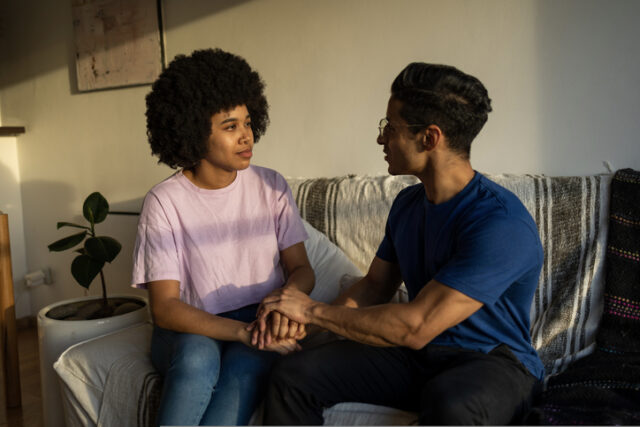Everyone messes up sometimes, but it’s how you make amends that matters.

If your partner hurts you or does something wrong, an “I’m sorry” is the bare minimum you should expect, depending on the offence. However, what if their partner feels insincere or half-hearted? Here’s how to respond to a bad apology.
1. “I appreciate you trying, but I’m still hurt.”

It’s important to acknowledge the effort they’ve made, but you’re also being clear that you’re still affected. Letting them know you’re hurt gives them a chance to dig deeper and figure out what’s missing in their apology. You’re showing that while you’re open to making things right, there’s more to talk through before you can move forward.
2. “Can we talk about why this happened?”

Instead of focusing only on the apology, shifting to why the problem happened in the first place can be more productive. It opens up a space for them to explain themselves and for both of you to understand each other better. By getting to the root of the issue, you can work on preventing it from happening again, which is just as important as the apology itself.
3. “I need you to understand why I’m upset.”

If they’re apologising without fully understanding why you’re hurt, it might feel empty. Asking them to really listen to your perspective can help bridge that gap. Sometimes people need a bit of help stepping into your shoes, and this is your chance to explain how their actions impacted you, allowing for more genuine understanding.
4. “Let’s take a breather and come back to this.”

Sometimes things are too heated to be productive. Suggesting a breather allows both of you to cool down and reflect on the situation. This isn’t about avoiding the conversation—it’s about giving yourselves the time to approach it with a clearer mind and a more thoughtful perspective.
5. “I feel like you’re not taking this seriously.”

When an apology feels dismissive, it’s natural to feel frustrated. Calling it out without being accusatory helps set the tone for a more sincere conversation. Sometimes people don’t realise how flippant they’re being, and by pointing it out calmly, you give them a chance to step up and address the issue with the seriousness it deserves.
6. “What would you do differently next time?”

Instead of getting stuck in what went wrong, asking this opens up a conversation about change. It encourages your partner to think about solutions, which can be more effective than just saying “sorry.” You’re focusing on how to make sure this doesn’t happen again, which shows that you’re both interested in growing and improving the relationship.
7. “I need more than just words right now.”

Apologies are important, but actions matter just as much—if not more. When you tell them you need to see a change in behaviour, you’re setting the expectation that they need to follow through. You’re making it clear that saying “sorry” isn’t enough if the same thing is just going to happen again.
8. “Can you help me understand what you’re apologising for?”

Sometimes apologies can be vague or seem off-base, and that’s often because they don’t fully understand the issue. Asking them to explain gives them a chance to show they really get what went wrong. This can also help uncover any misunderstandings, ensuring you’re both on the same page before moving forward.
9. “I’m not ready to accept your apology yet.”

It’s perfectly fine to need more time to process. Apologies don’t always fix things instantly, and telling them you’re not ready yet can be a way to honour your own feelings. You’re letting them know that while you hear them, healing takes time, and you’ll come back to the conversation when you’re ready.
10. “How can we make sure this doesn’t happen again?”

Looking ahead and focusing on preventing the issue in the future shows you’re not just interested in hearing an apology—you want actual change. It invites them to be part of the solution, giving both of you the opportunity to learn from what happened and take steps to improve the relationship.
11. “I feel like you’re not really sorry.”

If their apology feels insincere, it’s important to be upfront about it. Saying this can open up a deeper conversation about what genuine remorse looks like to you. Sometimes, people don’t realise their apology is coming off as shallow, and this gives them a chance to reflect and offer something more heartfelt.
12. “Can we talk about how to make this right?”

Focusing on solutions can help turn an empty apology into a productive conversation. This shifts the dialogue from just “sorry” to actually fixing the issue together. It shows you’re willing to work through the problem, but also sets the expectation that action needs to follow those words.
13. “I need you to take responsibility for your actions.”

If their apology is full of excuses, this is your way of pulling things back to accountability. Apologies mean much more when they come without qualifications or deflections. You’re asking them to fully own up to what they did, which can lead to a much more meaningful resolution.
14. “Let’s talk about how we can communicate better in the future.”

If the issue seems to stem from deeper communication problems, this is a good way to approach it. You’re showing that you want to fix the bigger picture, not just the immediate problem. It’s about finding ways to strengthen how you both communicate and avoid future misunderstandings.
15. “I hear you, but I’m still feeling hurt.”

Acknowledging their apology while also being honest about where you’re at emotionally can lead to a more open dialogue. Letting them know you’re still hurt shows that more work is needed to heal, and it gives them the chance to offer more support or understanding as you process everything.
16. “Thank you for apologising. Can we talk more about this?”

Even if the apology wasn’t perfect, showing appreciation for the effort can help move things in a more positive direction. This also signals that while the apology is a start, there’s more to discuss to fully resolve the situation. It’s about keeping the conversation going so you can both get to a better place.




